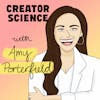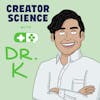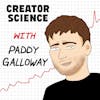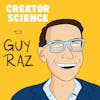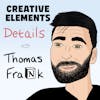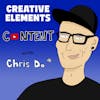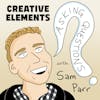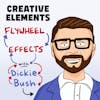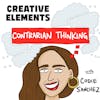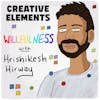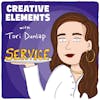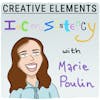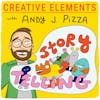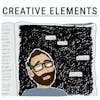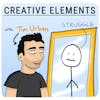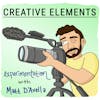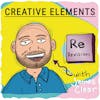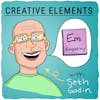
#42: Alex Cattoni – From behind-the-scenes copywriter to front-of-camera YouTuber
Play EpisodeAlex Cattoni is a copywriter, marketer, and the founder of The Copy Posse, where she teaches people to become freelance copywriters.
Alex Cattoni is a copywriter, marketer, and the founder of The Copy Posse, where she teaches people to become freelance copywriters.
In 2017, Alex started her YouTube channel where she now has 75,000 subscribers and more than 1.5M views.
In this episode we talk about Alex’s start at MindValley, her decision to freelance, the connection between marketing and copywriting, the massively successful launch of her coaching program, and why thinking about what she values has helped her push the boundaries of her comfort zone.
Transcript and show notes can be found here
***
LISTENER SUPPORT
Join our community on Facebook
Support this show through Buy Me A Coffee.
***
SPONSORS
Try Podia and save 15% for life as a Creative Elements listener
Start your free trial of SavvyCal and get your first month free using promo code ELEMENTS
***
ABOUT JAY CLOUSE
Subscribe to my weekly newsletter
Follow Jay Clouse on Instagram
Enroll in my course on podcasting, Podcast Like The Pros
***
PODGLOMERATE NETWORK
This show is a part of the Podglomerate network, a company that produces, distributes, and monetizes podcasts. We encourage you to visit the website and sign up for our newsletter for more information about our shows, launches, and events. For more information on how The Podglomerate treats data, please see our Privacy Policy.
Since you're listening to Creative Elements, we'd like to suggest you also try other Podglomerate shows surrounding entrepreneurship, business, and careers like Rocketship.fm and Freelance to Founder.
Learn more about your ad choices. Visit megaphone.fm/adchoices
Alex Cattoni 0:00
Any videos you see, any ads you see, it's all copywriting or storyboarding behind the scenes and so every single business every single creator, every single influencer, every single business on the planet needs copywriting.
Jay Clouse 0:15
Welcome to Creative Elements, a show where we talk to your favorite creators and learn what it takes to make a living from your art and creativity. I'm your host, Jay Clouse. Let's start the show.
Hello, hello, hello. Welcome back to Creative Elements. You know, pretty often on this show, guests will reference other creators that they've partnered with, done collaborations with or learn from. And for the last year or two, I've been really focused in my own business, on doing more collaborations with other creators too. Those collaborations opened the door to new audiences, and those audiences already have a degree of trust in you because they trusted the Creator who introduced them to you. Well, one of my most consistent collaborators over the last couple of years is today's guest, Alex Cattoni. Alex is a copywriter, marketer and founder of The Copy Posse where she teaches people to become freelance copywriters. I met Alex back in November of 2019 because I started seeing an influx of new email subscribers. When someone subscribes to my emails at JayClouse.com I asked him to tell me what's going on in their world that led them to subscribe. And suddenly, not only did I see a random spike in subscribers, but several of them mentioned that they found me through Alex, Cattoni's YouTube channel. Well, I did some digging and found this video called top 10 brands to follow in 2024 mad content inspiration, where she listed me alongside guys like Austin Kleon,
Alex Cattoni 1:50
Which leads me to number six on the list. Jay Clouse. Here is another entrepreneur known for his authentic and conversational copywriting. Founder of the Unreal Collective Jay Clouse helps creatives thrive as business owners. on his blog, Jay reflects on his latest learnings from building his own business. His down to earth tone creates a powerful connection with his subscribers creating an environment of trust and engagement as he shares his experiences and unapologetically reveals his feelings, wins and mistakes.
Jay Clouse 2:19
So if you're not already subscribed to my newsletter, you should obviously go do that. JayClouse.com/emails. Anyway, I was super thankful. And I reached out to Alex to say thank you for including me. And that opened the doors to us collaborating on other videos, workshops, and more. Today, Alex's channel has 73,000 subscribers. Her newsletter on LinkedIn has more than 30,000 subscribers, and she's grown her Instagram to more than 17,000 followers too. But the impressive thing here is that all of that happened in just the last couple of years. Before starting to create content herself. Alex was planning to go to law school. But right before she enrolled, she had a change of heart. You know,
Alex Cattoni 2:57
I had sort of this conversation with myself like, okay, Alex, what do you want to do? you're graduating from university, I had spent a semester working abroad in Vienna, Austria and really wanted to go back to Europe, started looking for international internships and stumbled across this little company called Mine Valley at the time, which of course is now you know, a massive publisher applied, got the job A few weeks later, I was moving to Malaysia. And that's how I got into the whole world of internet marketing sort of overnight, still with the intention of coming back and going to law school. But that quickly faded away once I realized that you can make money on the internet and back then it you know, that was a completely new idea.
Jay Clouse 3:38
So Alex started an internship with mine Valley in Malaysia. Fast forward a few years and she went out on her own as a freelance consultant. And then fast forward a few years after that, and she started her own YouTube channel.
Alex Cattoni 3:50
My name is Alex Cattoni. And I am a copywriter, and I'm here to help you become one too.
Jay Clouse 4:02
And since starting that channel, things have changed a lot for Alex, about six months into publishing one video is caught on and today has reached nearly 400,000 views.
Alex Cattoni 4:12
I had this like major hockey stick moment. And that was really exciting for me because it was like finally the YouTube gods are, you know, calling me worthy and showing me on the browse page and what have you.
Jay Clouse 4:24
So today, Alex is focused on her channel in her coaching program The Copy Posse launch pad. In this episode, we talk about Alex's start at Mine Valley, her decision to freelance the connection between marketing and copywriting, the massively successful launch of our coaching program and why thinking about what she values has helped her to push the boundaries of her comfort zone. Of course, I'll be sharing some of Alex's videos this week in our Creative Elements listeners group on Facebook, so join us there if you haven't already. And I'd love to hear your thoughts on this episode. As you listen, just snap a screenshot of your player. tag me @JayClouse on Twitter or Instagram, let me know that you're listening. But without further ado, let's hear from Alex.
Alex Cattoni 5:11
I think like many people, when I graduated from high school, I thought you could be like one of 10 things, you know, like, the super smart kids could be doctors and lawyers and accountants and whatever, right? And then there was all these other boxes that, you know, my 16, 17 year old brain thought I could do. And I have a twin brother, who is now a doctor. And naturally I thought, well, he's gonna be a doctor. So I'm gonna be a lawyer. That makes perfect sense, right? Like the way we make decisions at that age. And I think someone told me at one point that I'd make a good lawyer. And I just was like, Yeah, okay, cool. I could do that. And to be honest, I think I would make a pretty good lawyer. So you know, I just went through the motions. I graduated high school, I applied to business school, which is going to be quote, unquote, you know, pre law. I majored in business law and economics, graduated with a major in business law and economics from Business School, and then promptly started studying for the L SAT. And it was around that time that I started feeling this deep nagging that I didn't know if that's what I wanted to do. But you know, when you're that age, you just think that's normal. Like, nobody actually loves what they do. And nobody actually completely enjoys this path they're on and I was always kind of an overachiever. So yeah, I started studying for the SAT. And I never actually, I never actually went to law school, but was very, very close to applying. And that was still always my dream, to be honest. But I decided to put that on hold and wanted to travel.
Jay Clouse 6:41
What did you study in undergrad?
Alex Cattoni 6:42
I studied business like I went to business school. So I got a Bachelor of Commerce. And I majored in business economics and law.
Jay Clouse 6:49
What was the Mindvalley roll that you applied for?
Alex Cattoni 6:53
It was customer service intern. So like, bottom of the barrel I, I applied to, to answer customer emails. And that's what I initially got hired for, but only ended up doing that for maybe a month. And then because the company was growing so fast, and I was so hungry to learn, I just sort of continued to rise up in the ranks of the company while I was there, and ended up staying for three and a half years.
Jay Clouse 7:17
For people who aren't familiar with Mindvalley, talk a little bit about what that company does.
Alex Cattoni 7:21
Yeah, so Mindvalley is probably the top personal growth publisher online. So they publish a ton of online courses, and content from many of the leading authors, businesses, transformational brands on the planet. Yeah. And back then, I mean, they had I think, one or two authors that they were representing now, I think it's probably in the hundreds, but all sort of direct response marketing meets personal growth meets online content and sort of that that whole space in that world.
Jay Clouse 7:50
Yeah, I think this is so interesting. I was actually just talking to Ali Abdaal about this, who, you know, is a YouTuber, but like, started in medicine is technically writer, like, there, there are these number of careers that just every kid kind of grows up thinking about, and there is like, 10 of them, you know, it's like a doctor, lawyer, teacher. And you do you do look around at people around you, and you're like, oh, a job is a job and is the thing that you do, because you have to do it. You don't have to love it. Like you don't have to love your thing. Just pick one of those 10 things and be happy with it. And getting into this world of business and online. You start to see Oh, people actually like love what they do. And it's way more interesting and way more diverse. So what were some of those moments in that? That role at Mindvalley that started to change the way you're thinking about your own career?
Alex Cattoni 8:37
Yeah, that's I mean, that's such a that's such a great question. I think you're right, I think I think it's even a little confronting for people who are in jobs that they don't love. I know, even my brother has said to me at times, like where did what did you figure out that I didn't, you know, and he's a great doctor, and he does enjoy it. But man, if you're comparing, like, number of hours you put in to kind of reward freedom, flexibility and all that. It's, it's, I mean, yeah, he's like, what did you figure out, and I feel so blessed to have that experience to have had that experience young when I was at mine Valley. But I think the biggest thing for me was this idea that you can create something literally pull it out of your mind, put it out there on the internet, and the people who need to hear it, or the people who you want to reach can find you and it was sort of magic back then, you know, this was 2007, 2008 it just felt like magic to me. And of course, at the same time I was diving headfirst into into the world of personal development coming from a tiny town in Canada that you don't really talk about personal growth or self help and you know, I that I moved to Mine Valley learned about internet marketing, you know, Tony Robbins and all the personal development stuff, travel, you know, traveled across and lived across the world with all of these entrepreneurial, you know, minded people and it was like, holy crap, I mean, I drank the kool aid of that world and, you know, would probably tell talk about it to anybody who wanted to hear about it at the time. But I think that was the big kind of crazy aha for me is even the founder of mine Valley was such a huge inspiration and mentor to me, because, you know, he dropped out of university make to drop out or not, but he often talked about how that wasn't a very formative experience for him. And then, you know, got a job at a company where he really quickly found out that he broke the mold and didn't really fit into that norm either. And then move back to Malaysia, this was in the US move back to Malaysia to start Mine Valley and just to see that, you know, he had an idea and a vision and watching him bring it to life was so inspirational. And I think that to me, was just the the door that opened to realize, Oh, my gosh, I don't have to go down this conventional path and study my butt off to, to make junior partner at a junior associate, whatever, at a law firm or a mental work, you know, my butt off for another, God knows how many years just to, you know, experience what you think.
Jay Clouse 10:57
Take on a lot of debt. You know, this is this is one of the things about traditional higher ed that kind of irks me is not only do you think about, especially here in the US, it's been maybe different in Canada, but in the US, you often have to take on a ton of student debt, which is like predatory debt. And not only are you taking on that debt, but you also have the opportunity cost of not having a job not earning an income some other way. Like the cost is just enormous to do these these roots of traditional education. So what pulled you towards writing copywriting marketing? How did that transition happen?
Alex Cattoni 11:28
I think I always enjoyed it, but never understood how that could be a real job. I think like a lot of people. I thought advertising and marketing was limited to, you know, Superbowl commercials. And I pictured, you know, the Madison Avenue, you know, vibe of sitting around a table and coming up with slogans and taglines. And it just seems so just seems so like fairytale land. Do you know, like, how do I even get there? What is this traditional path to advertising and marketing, and I always enjoyed it in class, I just never saw the connection to how I could actually do that. And then when I and then when I started working at Mindvalley and was given sort of this playground to pretty much just put into practice all of these incredible marketing techniques and principles and copywriting that I had learned was such a an amazing gift at the time because the company was growing so fast. You know, that is the beauty of a startup environment. It's like, Hey, you speak English. You want to try writing copy? Yeah, sure. Okay, great. Go for it, you know, and I got I just started studying all of these copywriting programs and absolutely loved it. But what's sort of interesting about my journey as a copywriter is I it took me a long time to really own that title, because I don't know call it imposter syndrome, call it whatever you want. But I had learned from these like, greats, you know, the people who still to this day, they're, they're long gone, and people still worship them as sort of the grandfather's, of course, they're all men, the grandfather's of copywriting. And I felt like, Oh, no, I don't deserve this title. I just can do some copywriting. And so when I left Mindvalley in 2011, and started my consulting business, I was doing mostly marketing, consulting, and you know, funnel consulting, and then clients inevitably would say, Oh, do you know, a copywriter? Or can you write copy? And of course, my answer would always be well, I can, but I'm not really like a copywriter. And then I would just do it. And then sure enough, I really realized, Oh, I'm actually, you know, this is something I can do. This is a service I can offer, and basically did that solely for, I guess it was almost eight years.
Jay Clouse 13:34
The dangerous thing about imposter syndrome or like the the sad tragedy about it. Have you ever heard the Dunning Kruger effect?
Alex Cattoni 13:42
I haven't. No.
Jay Clouse 13:43
This is something that I think about all the time, which is basically the more you know about something, the less you believe, you know, about something like the less confident you become the more you know about something because you become more aware that, oh, gosh, there's so much that I could know. And people who know very little have the inverse, they feel very confident that they know a lot about it. So this like tragedy is we often have this imposter syndrome. And that's actually an indication that we are so much better suited to be doing the thing than most people. After a quick break, Alex and I talked about the connection between marketing and copywriting. In a little later, we talked about why the thing she valued began to change and how that ultimately led to her starting her own consulting business. So stick around, and we'll be right back. Welcome back. At this point in our story, Alex had decided to put law school on indefinite hold as she climbed the ranks at this new startup Mindvalley. During her time there, Alex would climb the ranks from customer service to leading their marketing team, but I know Alex as a copywriter. So I asked her how she thinks about the interplay between marketing and copywriting.
Alex Cattoni 14:49
To me marketing and copywriting, they go hand in hand and the reason why that is is especially in today's world of digital marketing, I mean Just even look at the past year, you know, if digital marketing used to be kind of a new trendy thing, you know, even my grandma is a zoom aficionado now, right? Like, there's no one on the planet that doesn't understand the power of online. Did you know the digital world online marketing? And if you think about how that's communicated, even if it's through video, even if it's through audio, even if it's through text, there are words, you know, other you know, of course, not when we're doing live, which is more of an interview style, but any videos you see any ads you see, it's all copywriting or storyboarding behind the scenes. And so I think what's really interesting to me is that I have tons of students that this really blows their mind when they think of it this way, but every single business, every single creator, every single influencer, every single business on the planet, needs copywriting, whether it's writing influential social media posts, whether it's writing emails, whether it's writing, you know, a tagline, or text on a website, all of that is sort of considered copywriting. Anything that is written for the purpose of getting a conversion, which one might argue is the whole point of marketing as well, right marketing is to get a desired response from your target audience, whatever that looks like. And so copywriting and marketing kind of go hand in hand content writing, on the other hand, and a lot of people get those two confused, and I, I separate them, because I think their objective is very different. Content writing is more about engagement and having a conversation. It's brand building, it's creating rapport, it's educating, it's adding inspirational value, all of that is content writing. And the sole purpose of it is for engagement and brand building. copywriting on the other hand, is very, very linear and strategic in the sense that it's written for the, for the, you know, sake of getting some desired response from your audience.
Jay Clouse 16:47
I have a little bit of a bias of having writers on the show writers of all kinds of flavors, and personally is because I relate to writing a lot and I like to write, but also, you know, as you're talking about copywriting, I'm thinking about communication, and how even going back to just like anybody who has an order or a persuasive speaker, yeah, they're speaking on the fly. But they're using the same tool as copywriting. They're using language. It's almost like they are excellent copywriters. They're just doing it on the fly, you know, they're not writing it down. Whereas at the end of the day, it's all about communication. And copywriting is like, a beautiful way of making sure that your communication is working in the way that you want. And writing it down. I just think that writing is the underpinning of everything when you get down to it or can be.
Alex Cattoni 17:32
Absolutely, I mean, you think of those great speakers, and it's so interesting to me to break down, you know, I think of President Barack Obama, and the way he spoke was so hypnotic, and he's actually been trained in, in, you know, persuasive speaking. But yes, he's speaking it, whether or not he's reading a speech or has memorized a speech, you know, that it's his journey into that started with writing, and exactly what you said, even if someone's talking on the fly, and a lot of people will say this to me, like, I feel like you speak in copywriting now. And that just happens. It's like a byproduct of being a writer, you naturally I think, improves your communication on all fronts. But if you think of some of the core concepts of copywriting, like opening loops, you know, great speakers know how to constantly open loops so that they keep their their listener engaged and listening. They know how to tell stories, you know, that's all that's all writing. So an open loop is it's something that it's it's, it's a very, very classic marketing technique of saying something that creates the need for you to want to continue listening or reading in order to close that loop. So the classic example that we all see is our favorite TV shows. I mean, last was famous for this, you know, it ends and you're like, but what, like it shows you what happens, then it stops if you absolutely have to watch the next episode. Soap operas do the same thing, you know, even The Bachelor, because I remember thinking this is, you know, back in the day, why don't they just do the rose ceremony at the end of the episode. And it's because that just closes the loop nicely, you don't really feel like you need, you can skip an episode, because then one more person will be gone. There's no need for you to continue watching. But what they do as they put the rose ceremony, like right smack dab in the middle of the episode, then they carry on with all the regular drama and whatever happens in the bachelor so that you have to come back and watch the next episode to find out who gets voted off or whatever. And so, you know, in marketing and copywriting, it's as simple as saying, Oh, you know, hey, Jay at the end of this, I'm going to tell you the three things that I do every single morning when I wake up to help me get into creative flow. But anyway, so you know, it's like, wait, what, like that's a simple, simple example of opening a loop where I'm simply just telling you why you need to continue listening.
Jay Clouse 19:44
I love that example. And as I'm thinking about this, Mallory and I are literally watching The Bachelorette right now.
Alex Cattoni 19:50
I've had a feeling
Jay Clouse 19:52
And we're also now for the first time getting into Survivor. Survivor is the opposite. They actually right at the end, they close that loop. They're like, you're going on, we'll move on to the next episode, but it still works. So it's like, you know, they, they're probably if we look deeper at it, they're probably opening up a different type of loop. But I love that example. Something that you you kind of threw out there a minute ago was that you started a consulting business in 2011. So talk to me about that next step in your growth personally, why you decided to go out on your own and start a consulting business?
Alex Cattoni 20:22
Yeah, I mean, that was such a big decision. And I think, you know, I was ready for a change, I noticed that my values were really shifting. So I loved my job at Mindvalley, but I still worked a nine to five, I still had to be in the office, for the most part, I was able to travel the world on, you know, on my weekends, or take a week off here and there. But for the most part, you know, I had a nine to five. And I was living in Malaysia, and someone who's always been a real family person, I thought I was only going going for six months, that taint changed into three and a half, almost four years. And I just really missed my family. And intuitively, I just felt like, you know, when they always say, you know, leave when you're on a high note, I was the top person in the company when I left on the marketing side. And I was still learning and growing, but not nearly at the rate that I was learning and growing prior to that, and my I realized my job, it really turned into people management over create creative work and in marketing. So yeah, I made the decision to leave it was tough. But for me, it was like, No, I'm gonna leave well, while I'm on a high note, and I know, I think I was full of piss and vinegar, too. I was like, I'm going to be an entrepreneur, and this is going to be amazing. And I laughed, and man, that was the most humbling experience of my life, you know, I went from being star employee, creative director of a multi million dollar business is at age 25. To try out, you know, traveling the world, you know, posting about it on my Facebook, I, you know, just looking like a rock star. And then moving back to Canada and sleeping on an air mattress from Walmart and my friend's room where her you know, Dad was nice enough to pay me for charge me $400 a month rent, because that's all I could afford. So it's like, holy, humbling experience, you know, but I wouldn't trade it for the world. Because ultimately, that's what got me here. But yeah, I mean, it was a really scary leap of faith, and I had some savings. And I just, you know, that's when you get into like, Okay, I'm not gonna be sleeping on this air mattress forever, I need to, I need to hustle. And that's when I started going out and getting clients and, and, obviously, using my experience at mine Valley, which at that point has was really starting to become a well known company to get clients.
Jay Clouse 22:28
I love this story. Because, you know, we kind of know where the story ends, like you are, at least to today, like you're, you're you're crushing it on YouTube and everything that you're doing. But going back further, you know, six plus years before you started your channel, you're starting your business, and it's hard and you have like the air mattress moment. So can you stay in this painful moment for a little bit and talk about that first year in the challenges of saying I'm going to be an entrepreneur and going after and getting your own clients, even after you had such great experience?
Alex Cattoni 23:01
Yeah, I mean, it was the first thing it was very isolating. So you know, leaving a company of 50 odd people at the time, who were all my age, you know, an international community where I literally all day every day was just surrounded by incredibly motivating young, hungry, entrepreneurial minds going from that to living alone, I was living with a friend, but she had spent a lot of time down in the States at the time. And so most of the time, I was alone. And it was incredibly scary. I mean, I went through a few months thinking I made the biggest mistake of my life. And I often think I wonder what what happened if I never left, you know, where would I be now, but obviously, you know, never look back. But I remember one day, like feeling so trapped in my apartment because I could go walking, but I couldn't really afford a vehicle. And this was before Uber and I just, you know, was felt very isolated. I remember calling my mom like sobbing and being like, can you buy me a bicycle, because I just wanted to like freedom. I just wanted to be able to ride my bike somewhere. And my mom lent me the money to get to buy a bicycle. And you know, it was just, it was so incredibly, just isolating and difficult. But you know, I, I'm one of those people who have I have a hard time admitting when I'm wrong. So I think I had this mindset of like, I'm going to make this work. You know, I don't want my family to look at me be like, Oh, yeah, see, she shouldn't have left.
Jay Clouse 24:29
What was the service that you were selling at the time when you left and went on your own?
Alex Cattoni 24:32
I was doing marketing consulting, specifically for online personal development brands. So that was sort of what I knew. You know, I knew how to do info marketing and how to build sales funnel for info products. That was my community at the time through a lot of networking. That's something that I think, obviously it's tricky to do now. But once the world returns back to normal and events are a thing again, I met my first client just at a marketing event, networking at a cocktail party and you know, ran into someone and started chatting, and that's how I how I met my first client. And Fun fact, they're still my client today. So they are my first and longest and biggest client.
Jay Clouse 25:19
That's awesome. will talk to me about this, then, you know, you were you're at the top of your game at mine Valley and you were the top person in their marketing team, you go out on your own, you probably didn't have to do a ton of direct, like client sales at mine Valley. So what was that like learning that process? Did you feel confident in selling a service? And like getting a contract signed? Or was that difficult for you?
Alex Cattoni 25:40
That was really difficult. For me. I think like everyone who's just starting out in the freelancing consulting world, it's like, you want a plan, you want to know the exact steps to follow, you want to know exactly how much to charge. And I'll be honest, I still you know, I do some consulting work still, through my agency, I still get that little pang of like, oh, like, Am I charging enough? Am I charging too much? Are they gonna think this is stupid? You know, and I think that you no matter what, you always sort of feel that. And just leaning into it. You know, I think looking back, I was probably incredibly awkward and didn't know what I was doing. And I never followed any sort of like paperwork or statements of work or contracts or proposals. I mean, I was wild, wild west in it, you know, and I think that this baseline, and for me, this was what built my whole business was just relationship building. And just being a cool, genuine person, you know, I think I did have some contacts leaving Mindvalley. But you know, most of the clients I ended up working with, we know, were no in no way affiliated with Mindvalley, it was just being able to showcase that experience and feel confident about it, even though my confidence took a major blow, obviously, after leaving and, and experiencing that, you know, air mattress moment, as you called it.
Jay Clouse 26:54
So How and when did the tides start to turn? How did things start to change for you?
Alex Cattoni 26:58
You know, I think it was just, it was just real hard work and gradual improvement. You know, I like I said, I met this one client, initially, they only hired me for a one off project, I think it was like $750 to write a sales page or to update a sales page. And that then turned into, okay, yeah, it looks like this is something you can maybe help us with ongoing, so that turned into a low monthly retainer, which then turned into revenue share, which then turned into equity in the business. And, you know, I think, for me, the lesson is just show it like showing up and adding value and, and focusing on building relationships, because it is so much easier to make money from the people who already know like and trust you than it is to go and find a million more tiny little projects where you're spending the majority of your time just kind of trying to close new clients. So as a result of that one client, I was able to continually grow and make more money there, you know, then I had a little bit of that security where I was able to then go and get more clients without feeling like I absolutely needed them in order to you know, not sleep on the air mattress anymore. And so I think that's, to me, the most important thing is everyone gets really caught up on on finding new clients, which of course is important, but you should be focusing on finding the one client that you ultimately want to work with long term because that's to me what ultimately had me grow my consulting business and then get to that point of sort of consistent income, freedom and flexibility and really living that like digital nomad, you know, copywriter lifestyle, where I could travel and what have you.
Jay Clouse 28:36
Totally, this is another one of those like, sad realities that are hard to just dig out of, kind of like imposter syndrome and the Dunning Kruger effect. The easiest way to get clients is when you don't need clients. And part of that is mindset, part of that mindset. People feel that and they're they want to work with people who are busy. But also, you need to be able to go into a conversation and not emanate this energy that I need this or it's just not gonna happen.
Alex Cattoni 29:00
Yeah, they say the same with actors going into auditions as well. They always want the actor that's not like, Oh my gosh, if I don't get this, I'm, I'm a failure. And I, you know, I need this to pay my bills or to get food. It's the actors that go in kind of easy, breezy, like, I don't need this. This is just a fun little thing for me. Those are the ones that get the jobs, you know, it's people. People don't like the sense of desperation. And it's hard. It's hard to kind of step out of that.
Jay Clouse 29:25
Yeah, I think it's I think it's an at the risk of going too far down like the sales conversation because I love talking about sales. I think it comes from a place of because we have so many decisions to make and so many options that we could take. We're more and more afraid of making the wrong choice. And when we feel or sense a little bit of desperation, that's a signal that we're making the wrong choice. There's somebody out there that you should be talking to instead, because something's off here. This person needs this. That means you're making a wrong decision. Yeah, it's hard to just like put on confidence. When we come back, Alex talks about her decision to put herself out there on YouTube. And later on, she'll explain how her YouTube channel led to a very successful launch of her coaching program right after this. Welcome back to my conversation with Alex Cattoni. Despite the initial challenges, Alex found her groove and built a comfortable income as a freelance copywriter, she told me that her value of embracing discomfort, the same discomfort that push her to go out on her own in the first place, started pushing her towards a new challenge of publicly putting herself forward.
Alex Cattoni 30:28
So from 2011 to 2019, so I was like seven to eight years, I only did freelance copywriting. And that is, that was, I mean, such an incredible time in my life, because I had sort of all the freedom in the world, you know, I was accountable to, you know, maybe four people at a time if I had four clients at a time, and that number would kind of fluctuate up and down. But it just felt it to me, that was my initial goal. You know, when I left Mindvalley, I remember thinking, it was like your goals change, right? Like your, your purpose changes. Like when I left Mindvalley, my core purpose, reason for being was okay, as long as I don't have to get a job. If I can go, if I can go six months to a year without getting a job, I've made it, you know, and then hey, I went six months to a year without having to get a job. And then you know, your goals change a little bit, your values changed a little bit like okay, now I want to get to a point where I can actually live in the type of home that I want, and have the type of freedom and flexibility where I can afford to travel, go to events go to Italy in the summer, you know, to me the travel lifestyle became that like next big goal, and, and the freedom you know, the freedom to, to just do whatever I wanted when I wanted it. And to only have a few calls with a few clients every single week felt like to me like that is all I want in life. And then I had that for a while and I'll be honest, I coasted for a couple of years. I was I was like, what this is amazing. I was traveling all over the place. I was like reading, writing copy. And to me like that was the bee's knees. It didn't need anything else. And then I think, you know, you have that little nagging voice inside and it's sort of the, the like, okay, Alex, you're a bit too comfortable. Like what's next. To me, I like to lean into the things that kind of scare me the most, you know, I just I kind of get addicted to that feeling like even moving to Malaysia, you know, after having two conversations with people I'd never met and, and all of that, like, to me, I get this feeling of like, that is freaking scary. That probably means I should do it. And I, I had a really big fear of putting myself out there, which anyone who knows me who knows that I might be gregarious and outgoing. And, you know, I think I was hiding behind that a lot. And the thought of putting myself out there on video felt like the like, it felt like death. I was like, that is the scariest thing in the world that I could possibly do. But I just I really was like, You know what, this marketing and copywriting world like, I'm tired of playing small and like bowing down to like the old boys club because I don't feel worthy enough to take part in it. My why like my reason for doing it was like, there needs to be a woman representing in this space, there needs to be a different voice and people are wanting a different voice right now. And I thought you know what, if all i if all I do is inspire 20 people to start a copywriting business or to enjoy this craft as much as I do, then I've done my job. So everyone always asked me because I'm a marketer, they always ask me, Well, what was your strategy behind starting your channel, and I'm like, I had that, like I, this wasn't like a power move. This was me just more of a personal goal of putting myself out there. And I kind of threw my hands up and about, you know, whatever will be will be I'll see what happens and and I set the goal of just recording for videos to start, because that gave me a month of content. And it gave me a month to then create more content. And that's sort of just is what started the ball rolling.
Jay Clouse 33:48
And this was in 2019.
Alex Cattoni 33:50
Yeah, so I had the idea to do it like late 2018. And then my first video is published February 13 of 2019.
Jay Clouse 33:58
This is a pretty in the weeds question. But what was the extent of the rest of your like, external public presence? Did you have a website? Do you have a newsletter? Or was this like your first public content that you're creating?
Alex Cattoni 34:11
I had put up my website in 2016 I believe 2016 or 2017. And I was so resistant to that, because that even felt, I think, again, as like a copywriter who was getting all of my clients through referrals. I was confused about why I needed a website for a long time. I was like, Well, I don't need more business. So what's the point of it? And it wasn't until I got asked to be on a podcast or something through someone who knew my work. They're like, where can people go to learn more about you? And I was like, um, like I it was just such a rookie in the in in my personal brand. And that's when I was like, Alright, I'll put up a website. So I had like a very, very basic one page or kind of about me style website. And that was basically it.
Jay Clouse 34:58
Crazy. So you have this plan. To put out four videos, this is like your first public a. I'm Alex, I'm going to start sharing some of my ideas with you publicly. And I'm assuming because you have the plan of four videos, you are also still at time fully thinking like my moneymaker is consulting and continuing to work with with these companies and brands. So walk us through the next several months with this isn't a super long timeline. You know, we're sitting here doing this interview in December of 2020. We're talking about the beginning of 2019. So walk us through the next several months of what happened after you publish those four videos and how things evolved.
Alex Cattoni 35:34
Okay, so the first video, I was like, Oh, my God, I'm on fire. Because you know, you have that like friend and family effect where everyone's like, Oh, my gosh, I got 200 likes, and then you realize it's like your mom and your grandma and your best friends. So I was like, Oh my god, the first video, I was like, I'm on a roll. You know, I got like, a little spike. I think I had like, 200 views, and I was like, feeling fine. And then I published video 234. And it was like, oh, I've already gotten the token. You know, Mom, like, she doesn't realize that she needs to like all of my videos. What's going on here? I yeah, oh, man. It's confronting, you know, because I get anyone who creates content knows. It's like, as you know, as a Podcast Producer, and someone who does a YouTube channel, and anyone out there listening who creates content. It's always funny when you talk to people, and they're so stressed about the first episode, and then you're like, honey, no one's gonna hear it. It's fine. Or like, Oh, your family's gonna hear it, you know? And, and that's always like it says, just start, just do it. And so yeah, so I had my first four videos, and I cringe when I see them, because I'm like, why did I do that with my eyeliner or whatever, you know, just how you normally do and you're listening to yourself for the first time. And then it was a labor of love. So I mean, like you said, my business, quote, unquote, was my consulting. So I truly felt like I had taken on a second full time job and not getting paid for it. So I published a high quality video, every single week, maybe I took off one or two weeks in that timeframe, from February 13. And it wasn't until I remember it so well. It was August 7, because it's my It was my birthday, that I woke up to 1000 subscribers.
Jay Clouse 37:15
Okay, well, hold that. Let me let me hold that open loop. Yeah. What is what is a high quality video? What did that mean to you at the time?
Alex Cattoni 37:23
Right? That's a great question. So to me, that means not just webcam sitting in front of you know, my computer, rambling on about stuff and not having an engaging high quality video. So, you know, I was, you know, picture me I'm in my studio, I get my light kit, I put up my wall behind me, which was another whole thing. I mean, that probably held me back for two months, because I didn't know what to put on the freakin wall behind me. People are so funny. And I went to I finally went to the bookstore down the street and I bought these like generic quotes. And guess what, they're still on my wall.
Jay Clouse 37:52
Have a live, laugh, love back there.
Alex Cattoni 37:54
We don't have a live, laugh, love. But we have you did not wake up to be mediocre. In case you didn't know that. But you know, that held me back for so long. Because it's like, oh, no, I need this. And I need the perfect camera, and I need the lighting. And I you know, and I finally just was like, You know what, I bought it on Amazon, I set it up. But to me, and then this is something I am really proud of is that, you know, my videos even though in the beginning, I didn't have a good of a camera and all that like they're they're high quality in the sense that I knew that in order to make this successful, I had to show people that I cared and put it in an effort. I think people appreciate that about my brand now. I think I get comments all the time that people say thank you so much for taking the time to like really make this a great experience. Because even though the content is great, and it would have been great if I was just sitting on my computer using my webcam, and like rambling about whatever, people enjoy the production value. So I was paying a video editor, you know, $500 a month, which is actually pretty cheap. he happened to be my brother, so he gave me a family discount. No, the other brother Could you imagine that would be a twist. So I paid my other brother, the video editor brother to edit my videos. And, you know, I had I had friends that were YouTubers. So you know, following all the rules, like make sure you punch in and punch out and break up the break up the scene every 15 seconds to keep people engaged. And I really, you know, took that to heart and did the best I could of course, you know, you learn as you go as well. But so I mean, we're talking you know, separate audio file with a lav mic, an SLR video camera, the lighting, the video editing the production, my bumper or Stinger at the beginning of my videos, I mean, all of that was was kind of put into the thought process of this. And so you can imagine, you know, every month paying not only $500 to my video editor, but the time commitment it took to really map out plan out script out all of these videos, and then give design notes and find the B roll and the clips and you know hiring a video editor or videographer to come get the role of me and really spending that time thinking okay, how am I going to build this up to be something that I would actually enjoy watching
Jay Clouse 39:58
you doing your own like design Up thumbnails. Were you cutting the video for some of these things. Were you storyboarding, like, have that flow look for people who were sitting here who probably are video editors themselves, but they're like, I want to take this seriously, from the beginning to like, what did that actual workflow look like?
Alex Cattoni 40:11
All I did in the beginning was I would come up with the script. So I would script out the videos, and then I would record them. And then I would send the audio file and the video file to my video editor. And he did all of the all of the cutting the videos and splicing and all of that, but I would leave pretty thorough design notes in the Google document. So I would say things like, pull up this clip here, and I would include a Dropbox link to another video clip of me or pull this up in text, or, you know, I'd be very hands on with the how I visually wanted it to look, a lot of video editors are great at this, I just am picky and like to kind of control what things look like if my face is on them. So I'm a little bit more involved than the average person.
Jay Clouse 40:54
I think it's good though, because you know, that is one of the notes that I had that I was gonna bring up to you is like looking at everything that you've created and put out there in the short amount of time it is really, really high quality, like the production value is really, really clear. And you know, the counterpoint to what you're saying about, you know, no one's gonna watch the first video, just get it out there. Some people can take that advice and just say, well, like, it could be anything, and you will get some value out of that practice. But taking this much intention upfront, goes really really far. Because this is something else I wanted to just like, thank you for sharing that your brother was doing this video editing, my sister does the artwork, for every episode of the show. People would look at that and think like, that must be such an expense. But there are people around who can help you when you're getting started. And you know, maybe maybe your siblings won't do this forever for you.
Alex Cattoni 41:36
Right.
Jay Clouse 41:37
You have to and you'll have to get you have to get someone more professional afterwards. But especially at the beginning, people are doing you favors, like the more meticulous you can be in your script in, you know, the details of whatever so they can work off of that is going to play in your favor.
Alex Cattoni 41:50
Yeah. And if you're so connected to like what you're doing, you'll find people who just want to support you. You know, I remember the day my brother fired me, but it was like a goal I was working towards because at that point, you know, my channel was starting to grow. And I could afford a real video editor who wasn't my brother, but there's so many tools out there that make it easy, like, you know, thank you for recognizing the quality of the work I put out there. And you know what, 90% of it aside from the video editing happens on Canva. Like, this is not, you know, I'm not paying 1000s of dollars to graphic designers every month. You know, it's it's all just kind of having a vision and sticking to it. So yeah, all to answer your previous question all of my thumbnails and all that I just do myself in Canva
Jay Clouse 42:31
Okay, so let's close this loop. You woke up on your birthday to 1000 subscribers? What happened?
Alex Cattoni 42:36
Well, first of all, I was like, Oh, my god, yes, I'm a real YouTuber. I made it, you know, um, but also, like, let's put that into perspective. February 13 to August 7, I mean, that's six months, less a few days, right? So it took me six months of doing I mean, like, do the math on that, right, like six months for videos, like, that's a lot of content to produce without really seeing a metric that, you know, even though the metrics, you know, 1000 subscribers doesn't really, really mean much, but it took a lot to get there. And there were there were moments where I was like, Oh, am I cut out for this? This is so much work. I haven't made a single dollar yet, you know, but I was so connected to my message. And while I was doing it, that, you know, I thought, Okay, I'm gonna keep going. So it was I think in about October, or November, early November, where I had that hockey stick moment where all of a sudden, I think for about a week, I was getting 1000 subscribers a day, I thought, oh my god, I'm going to get a million in no time. And then you realize that like, that's not how the algorithm works. It doesn't keep just giving you 1000 subscribers today. But then it wasn't until December that I because I had hit you know, a certain number of subscribers. But then in order to be monetized, you have to have a certain number of watch hours and all that. So it was in December, where I finally got my first YouTube payment from monetizing so February to December without making a single dollar.
Jay Clouse 44:06
What happened that it started recognizing you was there a video that started to catch for you?
Alex Cattoni 44:11
Yeah, yeah, I had one video that just started popping. And everyone kind of says that they're like, there'll be the one video that you're just like, Oh, wow. And that really shaped my business in the sense that when I started my channel, my intention was to teach copywriting training. And I kind of wanted to teach existing entrepreneurs and creatives about copywriting for their own business. But then I did this video I think it was like video number six so soon, early on, that I did a video on how to become a copywriter. If you're looking to start an at home copywriting business, this video is for you.
Hey guys, it's Alex and in this video I'm going to share the very first six steps you should take if you're looking to start a freelance copywriting business. And that video now has, I don't know, few 100,000 views. I think that video fueled basically the entire growth of my channel. And that's the entry point like that's where P how people find me. That's how people come in, which was surprising to me.
Jay Clouse 45:22
Well, and the other thing is, you know, this came up in the conversation to Ali too, because you put so much intention into your channel from the beginning, when those people came in, and they looked at it, they could see it, this was quality.
Alex Cattoni 45:31
Exactly, yeah, that is very, very true. They, you know, I've had people come in and be like, How the hell do you only have, you know, 5000 subscribers or what have you. And that felt good, because then all that that's what I love about YouTube, right? It's cumulative. It's not like, it's not like Instagram, where if you post something, after about a week, the viewership basically falls down to nothing. You know, that's what I love about about YouTube, in particular, is that a video that I recorded in March of 2019? Or Yeah, march of 2019, is still producing so much traffic for me.
Jay Clouse 46:05
So how did that change your expectation or thoughts about your own business?
Alex Cattoni 46:10
So that video, what's funny is once it started really taking off, I was like, again, thinking like a marketer that was never really thinking like a marketer. Before that. I'm like, I guess I should maybe build a list with this. So I put up a super simple landing page that, like, from a copywriting perspective is the worst, I wasn't promising anything, I was just like, Hey, get on my list. Truly, that's what the copy was, it was like, join my VIP Copy Posse list. And I didn't have anything to sell. So rather than put an offer on the other side of the opt in, I put a survey. And if I could, and I know you do this to Jay, that if I could give advice to anybody, if you don't have anything to sell yet, at least get data from your audience. And so I put a survey that I just said, Are you a copywriter or a business owner or an aspiring copywriter? What's your biggest challenge? You know, it's one of those Typeform like different brands, you know, different branches. So, you know, was personalized and, and I asked questions, and it was crazy to me how many people like the pain points are the number one challenge my audience was facing was so obvious from this data that I and then people of course, started asking me do you have a copywriting course? And I'm like, Well, no. So this is December, and I remember calling you being like, I'm doing a copywriting program. Would you be interested in doing a masterclass with me as a bonus? And you're like, yeah, sure, absolutely. So I basically came up with the idea of launching a copywriting program in December, I launched it on January 29, of 2020. So literally, a month and a half after I had the idea, that holiday was fun. If only I knew that this holiday, I would have had nothing but time. Yeah, so that gave me literally just hearing what my audience wanted gave me everything I needed to write a sales page and create a training program. And that became my flagship coaching program, the copy posse Launchpad. And I had no intention of creating a program when I started my channel. And then a year later, I was doing my launch.
Jay Clouse 48:00
Can you share anything about the success of that program? Or what that looks like? Anything? You're comfortable?
Alex Cattoni 48:04
Yeah. So I mean, again, I come from a direct response marketing world where like, the conversions you're used to seeing are pretty low, because you're buying cold traffic. And, you know, I had so many people say to me, how much is your product? And I was like, Okay, well, at the time, my coaching program was 1997, because it was the first time I was doing it. So I'm like, you know what, I'm going to give myself to these people for eight weeks, and I'm going to charge something incredibly reasonable. So it was $2,000, I had a list of 2800 people, which again, from direct response marketing standpoint is tiny. It's like, That's nothing. But these were all people who knew me, liked me trusted me simply because they came through YouTube, and had probably watched 234 510 of my videos before joining my list. So I literally almost pulled the plug, because so many of my direct response marketing friends were like, you cannot sell a $2,000 offer over email, you have to do a webinar, you have to do this, you have to do that. And I'm like, people are asking me for a program. So I'm just gonna do it. So I sold 44 people into my $2,000 program, from a 2800 person list, the very first product I launched.
Jay Clouse 49:16
Amazing, so great. And now with the growth of your channel, I imagine that that list has grown a ton.
Alex Cattoni 49:21
It has. Yeah.
Jay Clouse 49:23
But here's the thing that you're not saying that I'm going to say for you. Also, that sales page you put up was just like remarkably well designed. Thank you. So well done. Like it was obvious that you invested time money or both into it. Because it's it backed up to $2,000 price point for sure.
Alex Cattoni 49:39
Yeah. And that's I think important too, is like a lot of again, a lot of direct response marketers and I feel like you know, my whole my whole mission is kind of is kind of calling out some of the direct response marketers out there in a way that's like, hey, yeah, what you do is really important, and I love marketing and copywriting But in today's day and age people want people want branding and people want to feel connected to your brand. And guess what? They're gonna go look you up on Instagram, they're gonna go look you up on LinkedIn, they're gonna look you up on all the platforms they can before they make a decision like that. And yeah, I again I you know, there was a part of me that was like, This feels crazy, I spent a lot of money getting that website that webpage designed. But again, I'm like, you know what I want people to feel like, wow, this if this is what the website looks like, what is it gonna look like in the back end? What is this experience going to look like? And that's what people pay attention to? You know, if I have a generic white sales page with red headlines and black text, I'm not saying it won't convert, if the copy is great, it might. But that wasn't the experience that I wanted people to have right from the get go.
Jay Clouse 50:40
So my last question, you know, you said that when you started this, you didn't have a plan, your plan was that you didn't have a strategy, you had a plan of creating four videos. Now everything seems to have changed quite a bit. So what's the outlook on your business moving forward? like where are you investing your energy now?
Alex Cattoni 50:57
So my business has, you know, shifted from at, you know, will 100% Consulting and agency work to now probably 20% Consulting and agency work and 80% educational programs and training. And I always still will do some agency work, because I'm a big believer that if I'm going to be teaching people how to do it, I also want to be doing it, or else, you just become that sort of, Oh, yeah, back in the day, this is what worked. And you know, I like to stay on the cutting edge of sort of what's working and what's happening now. But yeah, my plan is to, I'm launching Season Two of the launch pad in January, I'm going to continue creating courses and trainings for my students, obviously, you know, sharing everything I'm learning through this whole crazy world, especially with all the shifts and pivots that have happened in the last year. And just you know, trying to help as many people as possible ignite their copywriting businesses, which to me is so exciting. You know, when I have the stay at home mom, who's who's, you know, wanting to take her passion for writing into creating a business or the nurse who's, you know, working crazy hours right now because of what's happening in healthcare. And she's studying my program in the evenings too. I mean, those to me, those are the stories that just I'm like, Oh my god, yes. Like this is why I do what I do. So that's the plan, I guess, just keep adding as much value as I can and and having a whole lot of fun doing it.
Jay Clouse 52:23
Conversations like this one are some of my favorite to have on this show. Alex has deep experience as a copywriter, but she's only been building her own content for the past couple of years. And despite that short timeframe, she's had a ton of success building her channel and launching her copywriting Academy The Copy Posse Launchpad, a lot of creators on this show got started way earlier than Alex, me and probably you too. But it's stories like Alex's that serve as a model and reminder that it's not too late for us to get started building our own businesses too. If you want to learn more about Alex or The Copy Posse Launchpad, follow @CopyPosse on Instagram, or visit AlexCattoni.com. Links to both as well as her YouTube channel are in the show notes. Thanks to Alex for being on the show. Thank you to Emily Clouse for making the artwork for this episode. Thanks to Nathan Todhunter for mixing the show and Brian Skeel for creating our music. If you like this episode, you can tweet at me @JayClouse and let me know and if you really want to say thank you, please leave a review on Apple podcasts. Thanks for listening, and I'll talk to you next week.
Most Popular Episodes
New to the show? Check out some of our most popular episodes.






